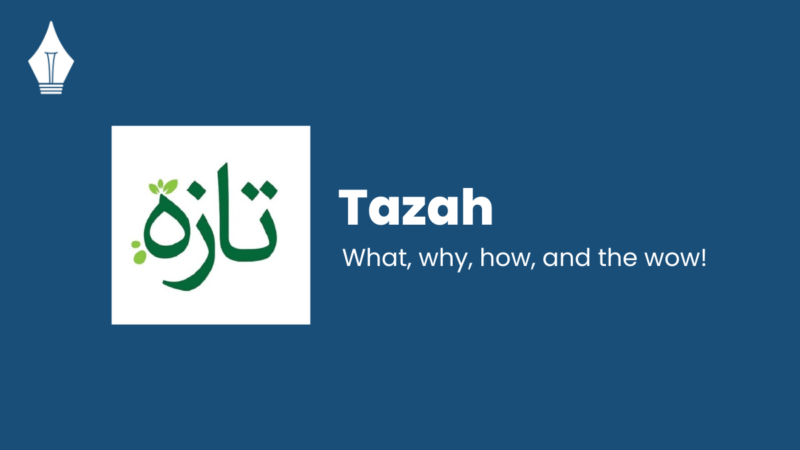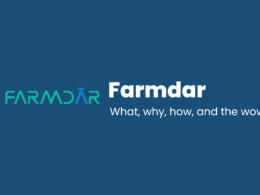The arrival of the pandemic bought with it the trend of ordering fresh fruits and vegetables online. When the people adapted to healthy eating, in an attempt to boost their immunity, fresh produce was the first thing they garnered. While some of them started at home or in a kitchen garden, others made use of online marketplaces to order fruits and vegetables.
Despite such services existing in the past, it wasn’t until after the pandemic took hold, that the importance of such marketplaces was revealed to the farmers, retailers, and the people alike. Naturally, many startups took the liberty of adopting this business model to make the life of the masses easier.
Among such startups is Tazah, which is a B2B fresh produce marketplace that connects farmers to businesses. They aim to solve the extremely complex agriculture value chain end-to-end through tech, resulting in dividends for both farmers and businesses.
Background of Founders

Mohsin Zaka
Mohsin is a UET Lahore alumnus, with a major in Computer Engineering. He initiated his professional journey as Assistant Software Quality Assurance at CureMD. After completing two years at CureMD, he graduated with a Masters’s in Business Administration (MBA) from LUMS.
Then after spending years at some reputable firms like Telenor, Careem, and Nestle, in 2021 Moshin alongside his partner launched Tazah.
Abrar Bajwa
Abrar graduated from National Textile University as a Textile Engineer in 2007. After completing his graduation, he started his professional career at Dewan Mushtaq Group as Assistant Manager of Quality Assurance. He joined Nestle as an Area Manager in 2012, and after six months he joined ICI Pakistan as Market Research Manager.
Abrar too like his partner has worked at some of the industry pioneers including, E&Y, Loreal, Careem, and Swvl. Then in September 2021, he along with his Mohsin founded Tazah.
What is Tazah?
Tazah is a Lahore-based B2B agriculture startup that aims at improving the lives of farmers, businesses, and consumers by building a tech-enabled OS for the agriculture and food supply chain.
Essentially, the platform serves as a marketplace that empowers businesses, mainly micro retailers or street vendors to procure fresh produce. The agritech startup sources the produce directly from farmers, sorts & grades it at its own warehouses, and then ships it to the street vendors.
Why Tazah?
According to the Pakistan Bureau of Statistics (PBS), the agriculture sector is the largest in the country, contributing around 24 percent to the country’s gross domestic product (GDP) and accounting for half of the employed labor force.
In a primarily offline farmer to retailer Agri supply chain, fresh produce such as fruits and vegetables from farms are sold by farmers to middlemen, who then sell it to wholesalers. Retailers then sell it to end consumers, deciding their margins based on the location they are selling at.
The business model caters to the problem of the massive price hike the produce goes through by the time it reaches the end customer because of multiple actors taking cuts in the form of margins at each stage these products are traded. Additionally, the retailer and eventually the customer pays a higher price for a product that has not only lost on quality but was also priced quite low at the beginning of the supply chain.
Tazah aims to eradicate such problems by directly connecting farmers to fruit and vegetable retailers, eliminating the traditional middlemen and wholesalers. Ultimately, the prices at which retailers procure this fresh produce from farmers are better and more affordable.
The company also runs a parallel storage and delivery service through which it is able to deliver better quality products directly to the retailers instead of them having to go out and procure fruits and vegetables themselves at the break of dawn each day.
The startup is already serving over 300 businesses and individual retailers of different sizes in Lahore and claims to have grown to an annualized gross merchandise value (GMV) of $7 million, with thousands of customers.
Tazah further asserts to have realized a high rate of month-on-month customer retention, with a large number of its customer base using the app daily and exhibiting a subscription-like ordering frequency, which is very rarely seen in other industries.
Funding Raised
Pre-Seed Funding – Raised $6.5 million
In October 2021, the startup raised $2 million in a pre-seed funding round co-led by Global Founders Capital and Zayn Capital. Other investors that participated in the round included.
- Ratio Ventures
- Walled City Co.
- i2i Ventures
- Suya Ventures
- Globibest
- Afropreneur Syndicate
- +92 Ventures
- Sunu Capital
- Musha Investments
- Mezan Foods
While senior executives of Careem and Swvl also participated in the deal.
Then in December 2021, the startup raised another 4.5 million in an extended pre-seed round.
The extension was co-led by Fatima Gobi Ventures (FGV) and Vibe Capital, with participation from:
- Shorooq Partners
- Nuwa Capital
- Ru-net
- Alter Global
- Julian.Capital
- Venture for Pakistan
- Early Grey Capital
- K3 Fund.
The round also included participation from Silicon Valley-based angel investors including Sahil Bloom, Siqi Chen, Matt Brezina, to list a few. While existing investors including Global Founders Capital, Zayn Capital, i2i Ventures with some other notable angels also followed on in the round.
Future Plans
The startup plans to use the raised funding to expand its coverage to other cities of the country as well as diversify its offerings and deploy financial products for farmers and retailers.
Increasing Farmer’s Profits
Farmers typically don’t know a lot about marketplaces and supply/demand beyond their communities. Time and again, they also end up in debt to middlemen because they lack access to working capital.
Although Tazah is currently focused on its supply chain network, the platform plans to eventually introduce financing options for farmers and retailers after going through several procurement cycles to understand the capital needs of farmers and how they are able to repay it.
However, some of the impediments they face include a lack of formal credit histories or access to financial institutions in rural areas. This prompts the farmers to seldom borrow working capital from intermediaries in the supply chain, or loan sharks who charge interest rates of more than 60%, creating endless cycles of indebtedness.
Reducing Food Waste
Over-harvesting is one of the major factors contributing to food waste, and one of Tazah’s objectives is to develop a data and analytics platform that will help farmers plan ahead regarding crop harvesting to make sure there is no oversupply in the markets they serve.
Ankur Nagpal, Founder of Vibe Capital said:
The company is growing really fast and on track to hit eight figures in annualized GMV in the next couple of months and that still represents a very small percentage of the overall market. What we are most excited about is the ability to build additional products (particularly financial products) for this market. For instance, Tazah is in a great position to start extending lines of credit to their business buyers that they pay off after reselling the inventory








